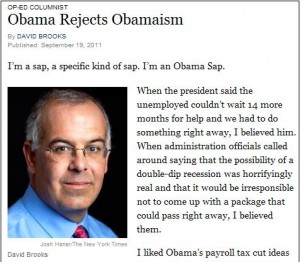I messed up. I owe you an explanation.
- Well, not really. I was on a delightful trip to Colonial Williamsburg with my 92-year-old father and hero, Ken Lewis, and took a couple of weeks off from blogging and tweeting. I apologize for not staying in touch.
You see, apologies seem to be trending. One of the emails in my neglected inbox was from Reed Hastings, the CEO of Netflix, which angered customers recently with a blockbuster price increase and a confusing bifurcation of its DVD and streaming movie service.
Hastings began the email with an apology: “I messed up. I owe you an explanation.” He continued:
It is clear from the feedback over the past two months that many members felt we lacked respect and humility in the way we announced the separation of DVD and streaming and the price changes. That was certainly not our intent, and I offer my sincere apology. Let me explain what we are doing.
Did this appease angry customers or impress Wall Street investors? No. A million customers quit the service, and Netflix’s stock price is less than half what it was earlier this year. “Netflix seems to be making a snuff film starring itself,” a Dow Jones Newswire columnist just tweeted.

Then, the other day, the New York Times columnist David Brooks apologized for “being a sap.” Specifically, he apologized to his conservative readers for his previous admiration of President Obama’s centrist, willing-to-compromise, pragmatic approach toward Congress. Obama’s sin: Proposing a $4.4 trillion deficit reduction plan that did not completely cave in to the Republicans. Brooks wrote:
It has gone back… to politics as usual… I was hoping the president would give a cynical nation something unconventional, but, as you know, I’m a sap.
Did this appease angry conservatives bitter about Brooks’s earlier tolerance for Obama? No. The flogosphere erupted in a fury of anger, from both left and right.
In an email to The Atlantic, Brooks mused on the value of apologies:
One thing I’ve noticed is that columns in which you admit error generate more hostility than any other kind. I did a series on what I should have known about the Iraq war and the response from the left was more vicious than at any other time, and I was making a few concessions to them.
Either they smell weakness and exploit it, or they feel more self-righteous than ever. In any case, the lesson is that from a public relations perspective, politicians are probably right in never admitting error in public.
Does this hold true as well for business executives? Should you apologize to customers or employees or investors for upscrewing something big? Is the best policy never to apologize at all?
The obvious advice is to avoid upscrewing in the first place. But upscrews happen. The key is to apologize strategically.
Do you hear HP’s Board of Directors apologizing for allowing a once revered Silicon Valley company to spiral into chaos and irrelevance? Or for even considering Meg Whitman as the next CEO? No.
[I started to list companies that ought to be apologizing for something, but that would consume far too much space. I apologize.]
Remember in April when Sony’s sloppy security allowed hackers to steal credit card information from 10 million Sony PlayStation Network customers? Sony had to shut down PSN for 10 days, knocking 77 million customers offline.
Kaz Hirai, Sony’s No. 2 executive, held a press event to apologize. These screengrabs say it all:
And remember when Apple cut the price of the new iPhone by $200 just two months after introducing it? Steve Jobs, not otherwise known for contrition, issued a public letter of apology, explaining why customers were ungrateful wretches but offering them $100 credit toward buying more Apple products.
Which reminds me of the delightful Joy of Tech cartoon from 2007:
Anyway, I apologize that this post has gone on so long without a conclusion. I promise to do better next time.
P.S. Hey, Reed, how about an apology for naming it “Qwikster”?


